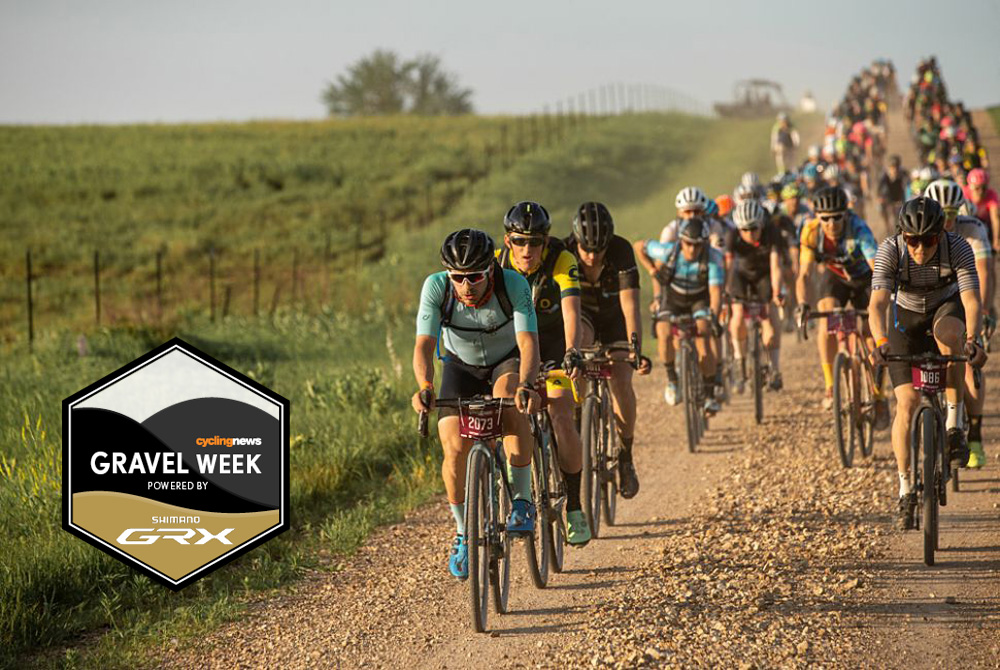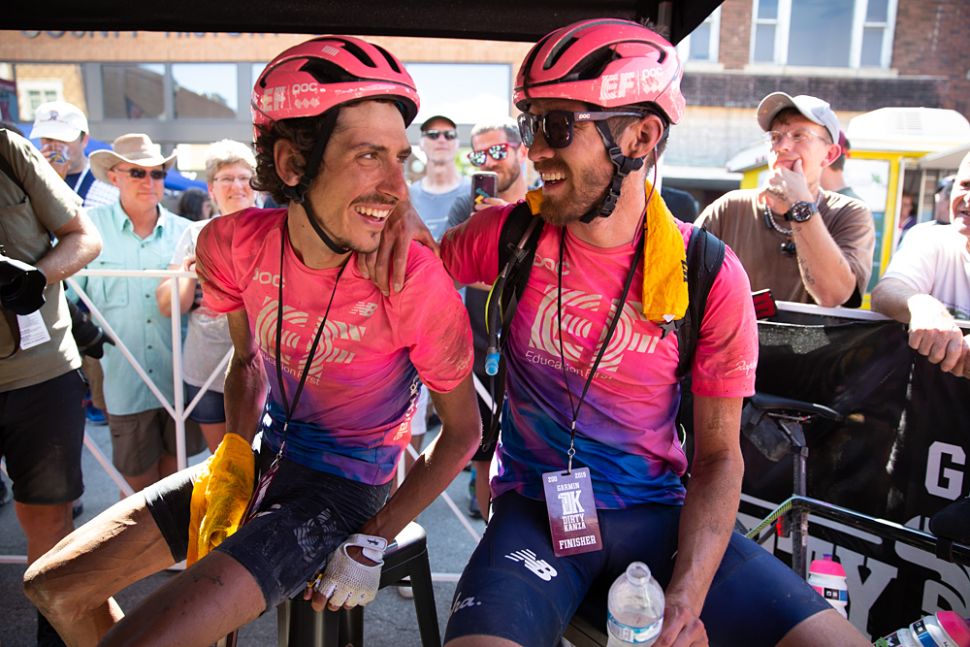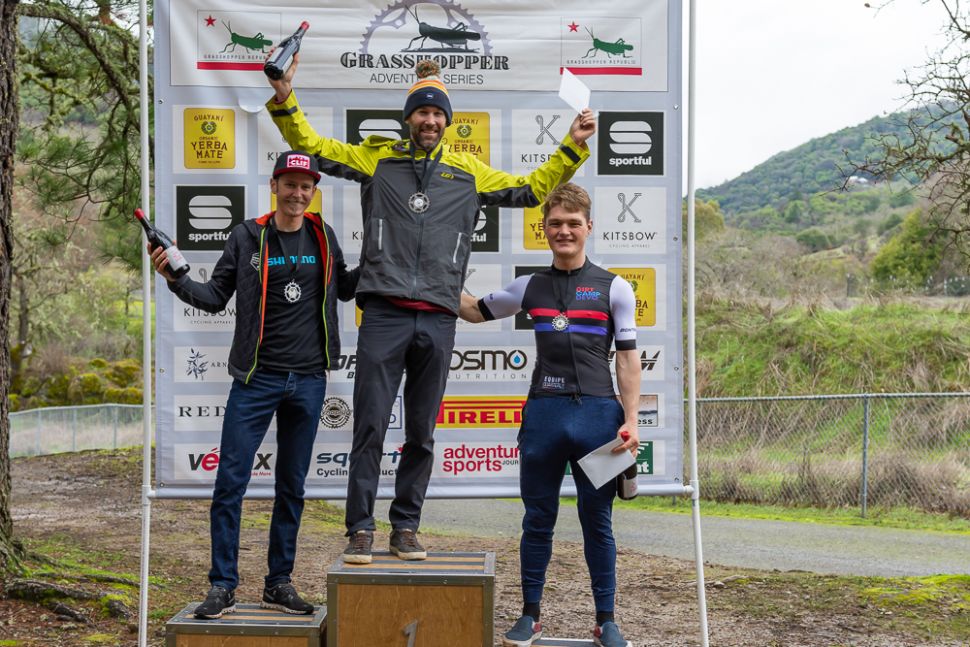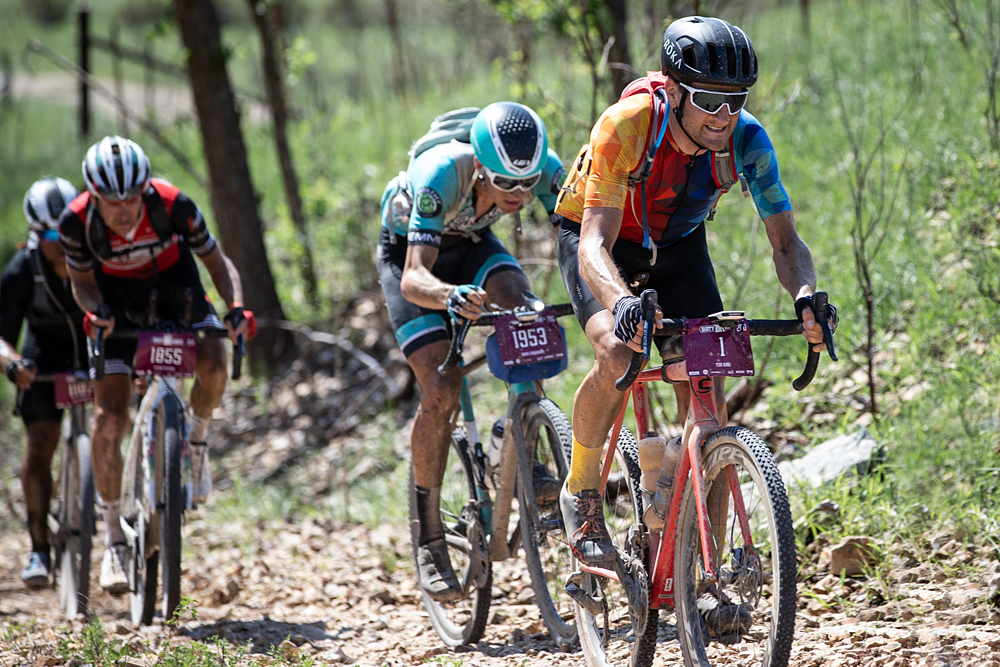Future Gravel: Where does cycling's hottest trend go from here?
Ted King talks aero bars, rankings, WorldTour pros, rainbow jerseys, and why all that will never quash gravel's free spirit

When we reached out to Ted King to ask if he’d discuss the future of gravel with us, he politely accepted but inserted the following disclaimer: "The answer is 'anyone’s guess'."
Gravel cycling seems to be approaching something of a crossroads. Actually, it's probably more of a spaghetti junction. The discipline has taken off to such an extent over the past few years that the bubble can surely only get so much bigger before it bursts and, if not disappears, then becomes something different again.
From the bike industry to the UCI, it seems everyone wants a slice of the gravel pie and, with money an invariably corrupting influence, the danger is gravel ends up selling some of the soul that brought about its rise in the first place. Part of the dilemma centres on the absence of ownership of gravel, still an unsanctioned, unregulated and largely free-wheeling corner of the sport.
King is one of a new wave who have turned their backs on the WorldTour and race gravel on a 'privateer' basis, which we’ve already explored during our Gravel Week. King was pretty much the first to do this, paving the way for the likes of Stetina, Boswell, Ten Dam, Tetrick, Eisenberg and surely more in the future.
As someone so heavily involved in the gravel scene, who has spent time not just racing its events but pondering its essence, he seemed like the perfect person to call to discuss where we’re heading next.
Cyclingnews: Before we get into the future of gravel, why don’t we start by looking back, and how it looked when you first got into it?
Ted King: The long and short of it is that five years ago, it was a very different scene. The first year I went to Dirty Kanza, there was a handful of domestic pro cyclists, but it was a very welcoming 'come as you are' scene. There were some folks who took it seriously but the term 'professional gravel cyclist' didn’t exist, and it definitely does now. It has just snowballed.
The latest race content, interviews, features, reviews and expert buying guides, direct to your inbox!
I've always come back to how welcoming the scene is. Even though you’ll get Stetina, Kabush in these events now, they can be there with 500 to 800 other people, and they’re all racing for that beer at the finish line. Now, in the present, it’s certainly more competitive, but I still think it has a lot of that original ethos.

CN: What was the catalyst for that sudden rise in popularity?
TK: It’s a bit of everything. It’s the industry as much as anything. People will say ‘we’ve been riding gravel for so many years and it’s funny how the industry is behind it now’, and that's true but, I tell you what, riding gravel now is a lot more fun given the tyres, the bikes, the compliance, the gearing, the brakes. It’s definitely driven by the demand of the consumer, as opposed to the tech coming down from the industry. This is the user saying 'I wanna ride, I don’t necessarily wanna race, I wanna get rad in the woods'.
CN: Whenever we review gravel products, there are always people who say they aren't needed – 'just ride a 'cross bike, or a mountain bike'...
TK: You can ride gravel on a mountain bike, but it’s way more bike than you need. A road bike is way less than you need, so you’re selling yourself short. I understand when people say that, and yeah, maybe it just takes the bit of experience to convince you that a gravel bike is the right tool for the job and makes the experience more enjoyable.
CN: That would indicate gravel is more than a passing fad, and is here to stay.
TK: I certainly think so. For me, this is the first type of cycling that has been so welcoming to the masses, and that might make a tidal change where more people are into cycling for good.
I often make the comparison that gravel is bringing people to cycling that wouldn’t get into a category-5 criterium, or a gran fondo. But this fun, adventuresome, experiential type of riding is the thing that will really draw people in.
'Don't be lame'
CN: As the discipline gets bigger and more money keeps pouring in, how to you hold onto that original ethos?
TK: It’s a great question and I don’t totally know the answer. It can be as simple as objectively looking at gravel and asking 'What works and how do we do more of that?' and 'what doesn’t work and how can we do less of it?'
For example, my wife and I have an event called Rooted Vermont and one thing we do is something called the 'mullet protocol podium'. 'Mullet' in cycling is business up front, party in the back, so for this you get on your phone and text to tell us who has worked really well, who has gone above and beyond, stopped to help someone out. The whole podium is about celebrating people at the back of the race. The reality is that a gravel race is a pyramid and there’s a lot of hard charging people up front but the party is pretty much the masses.
Then it gets more complicated. What’s nice is how unsanctioned these events are, how few rules there are, but that becomes a double-edged sword. As races get more competitive, at what point do you have to eliminate team tactics, aero bars, points systems? I personally like the races that have as few rules as possible. Like number one: don’t be lame. Can you imagine the UCI having a rule that says don’t be lame? The first 25 pages of the UCI rulebook are lame.
CN: What is considered 'lame'?
TK: It’s stuff like, don’t pee in someone’s front yard, don’t cut people off, stop if someone’s in trouble, be a good steward of the sport. It’s basically not taking advantage of situations and being in this brotherhood and sisterhood of cycling for the right reasons.
CN: I was going to ask what you thought of the EF Pro Cycling guys, after Lachlan Morton and Alex Howes rode Dirty Kanza last year.
It’s one thing having road pros make the full-time transition, but with EF and probably other teams in the future, it’s more that guys who are doing altitude camps and WorldTour races are then dropping into gravel events. Does that sit uncomfortably?
TK: It’s potentially awkward. In a way, they’re damned if they do and damned if they don’t.
All eyes are on the WorldTour guys coming over, so they certainly better win, to prove they deserve their spot in the WorldTour, or they better embrace the spirit of gravel or else they’ve just completely missed the point.

You know, thank god Colin Strickland won Kanza last year, because otherwise it was going to be a top-three WorldTour podium, and then what? They proved the point we already know – that they’re the fittest. When you eat, sleep, drink, train WorldTour cycling, you better be faster than everyone else, your power-to-weight ration better be better, your bike handling sure as hell better be on point. Those two [Morton and Howes] coming on over have been great, and they’re doing so many other events that I think it’s been well embraced. I don’t know… it potentially rubs me the wrong way if it’s not embraced in the right spirit – I guess it’s as simple as that. To come over in ones and twos is fine, but as soon as a whole team shows up then it’s like 'alright, give me a break'.
CN: What are your thoughts on prize money? That’s surely an incentive to go fast.
TK: The big one that’s a marquee event is SBT GRVL. They put up $5,000 for the win, equal for male and female. Admittedly, I won it and was very happy to take home that cheque, but I certainly don’t think gravel events need to have prize money. There are plenty of races where you race for a piece of art, or a belt buckle, or a cowboy hat, and I think it’s almost cooler to race for something priceless like that.
The whole financial side of it is interesting, because still there aren’t really gravel teams. There are privateer guys, like me, who are sponsored head to toe, but there’s only room for so many to do that. I don’t know if we’ll ever get to the point where individuals on teams are paid. I’d be perfectly happy if that doesn’t happen. For a start, it would make the racing more tactical – there’d be breakaways, chases, and soon you’re back into the whole rigamarole of conventional road racing, which I find kind of boring.
I like the ‘survival of the fittest’, ‘duke it out’ aspect. I like the privateer programme. I like the cavalier nature of the sport. I like racing for cowboy hats and belt buckles. I’m happy to take home a cheque but it’s not what inspires me. I know I could have better results if I lived an exclusively racing lifestyle – sleep, eat, train, race – but been there done that. This is just so much more fun. I have a beer probably five nights a week – ah, who am I kidding, seven nights a week – and that’s a lifestyle I just couldn’t have in a previous career.
Regulation and TV money
CN: You mentioned the word 'unsanctioned' before. As gravel grows, will it not go down the route of regulation, with governing bodies getting involved to make rules, series, rankings etc? The UCI has already shown an interest in staging a Gravel Worlds...
TK: When I talk to the biggest races in the States, there isn’t an interest to bring in governing bodies like the UCI or USA Cycling. These events exist independently and they do very well. They don’t need someone coming in and telling them how to do things and asking for a portion of the profits.
However, I can certainly understand why a smaller event would be interested in having the endorsement of the UCI and being on a particular series and basically getting free advertising.
Many of the gravel events are run by people who haven’t been event coordinators for the past 10 years, and they’re sort of doing it on the spot. I understand immediately why they might want support from other bodies. So where does that go? I guess I can see both ways - governing bodies coming in, some sort of amalgamated series. Life Time own Dirty Kanza, Big Sugar, and they bought Crusher in Tushar. They’re not currently part of series, but I guess there’s nothing stopping them from doing that.
On a way bigger scale, we live in a world of consolidation. If you’re a small company you get swept up. It’s rare that events exist in perpetuity small and independently.

CN: Can you see broadcasters coming in and these races being televised?
TK: Ah man, I hope not. I have a hard time putting my finger on why I like the loose free-wheeling nature of gravel. Whether it’s consolidation, a points system, world championships, TV coverage... all that goes in a direction I tend to shy away from.
Two years ago, my wife was in the pits at Dirty Kanza and she was live Instagramming, and she had thousands of viewers and people were relying on her to figure what was happening, and I kind of like that. To not really know what’s happening, to be left in the dark is better than a helicopter overhead and a motorbike in front. That’s just a world I don’t think needs to come to gravel.
Plus, I don’t think that model has really proven itself. The Tour de France makes money for ASO, but I would call the whole marketing model of WorldTour racing a little bit broken.
CN: You may not want it, but do you sense an appetite from the industry, from sponsors, for gravel to get bigger and bigger?
TK: I’m not seeing any pressure. These sponsors have their gravel programmes and their road programmes. I think they embrace the cavalier nature of it as much as anyone.
If they want rules and hard charging racing they can get that in the WorldTour. They certainly see the importance of it because gravel bikes are the best selling facet of bikes in the US, but there’s virtually no pressure there.
CN: If the sport does become hyper-regulated and there is a gravel rainbow jersey, do you think people will then turn back to the grass roots side, and that it will always come back to that element?
TK: I absolutely do. That is the masses, that’s what drives the industry. People always ask me about my tires, my pressure, my bike choice, and that’s what really stuck with me at my first Dirty Kanza - just how excited and impassioned everyone was, from those finishing throughout the day to deep into the night. No matter how consolidated it gets at the front, still the interest is gonna be there.

In five years' time
CN: You’ve been doing gravel for five years, so in another five years, a) what do you think it will look like and b) what would you like it to look like?
TK: Both are similar with shades of grey, which is 'more'… more people riding bikes, more gravel events, more people who are the competitive side, more people who are on the total amateur side.
I would not be surprised if there was some consolidation in five years. I don’t think it would be a coast-to-coast series, but maybe a pocketed series in the US. I also think there'll be a lot more events outside the US. I don’t picture a World Championships in five years but probably there will be movement in that direction – the very controlled side of things, I mean.
Given the sport of gravel is fuelled by the masses, many of those people don’t want a points system and all this consolidation. There are over 700 events in the US now and the benefit of that is people can leave the events that are victims of their own success, that are too big. The grass roots events that are currently 50-100 people, those are still plenty of fun. Gravel is sort of the democratization of cycling. It’s fuelled by the people for the people. It’s enhanced by the industry, but it’s by and for people who want to ride bikes. I don’t think that will change.
I won’t deny the potential for exactly what you're saying. We saw it with mountain biking, which was white hot then died. Every mountain bike team in the late 90s was sponsored by a car company – I don’t picture car companies coming the gravel. Maybe that’s a totally naive view. I don’t want to call it optimism and pessimism but the optimist in me says gravel will stay a gritty, different, independent sport, rather than bowing to the knees of dollars.
CN: How does that happen? Who are the custodians of gravel’s soul?
TK: I’ve spoken to a lot of riders, a lot of event organisers, a lot of astute minds, and I feel like everyone I talk to is on the same page, and maybe that’s it. I sort of feel like it is me, as much as it is Laurens [ten Dam], as much as it is Colin [Strickland], as much as it is the event promoters. It's all of us saying 'we don’t want particular things happening'. Maybe that’s what’s going keep the core values in place.
I don’t know. I guess I don’t have the answer.
Gravel is more than a cool bike, an epic ride, a ‘tache or a tattoo. It’s about the community. Find yours at the Gravel Union, gravelunion.cc
Patrick is a freelance sports writer and editor. He’s an NCTJ-accredited journalist with a bachelor’s degree in modern languages (French and Spanish). Patrick worked full-time at Cyclingnews for eight years between 2015 and 2023, latterly as Deputy Editor.
